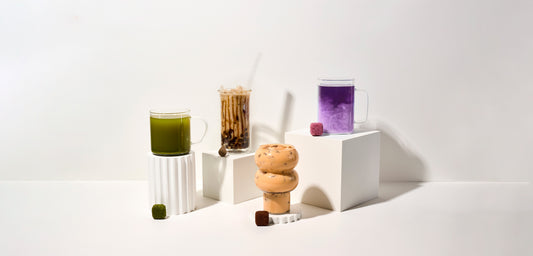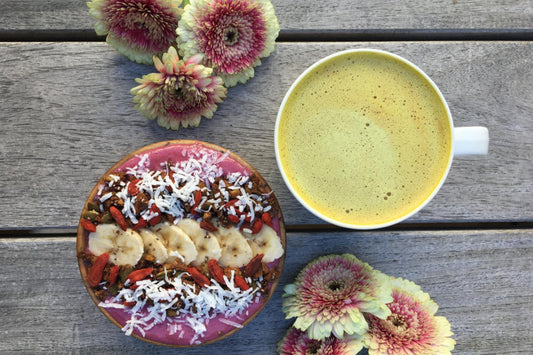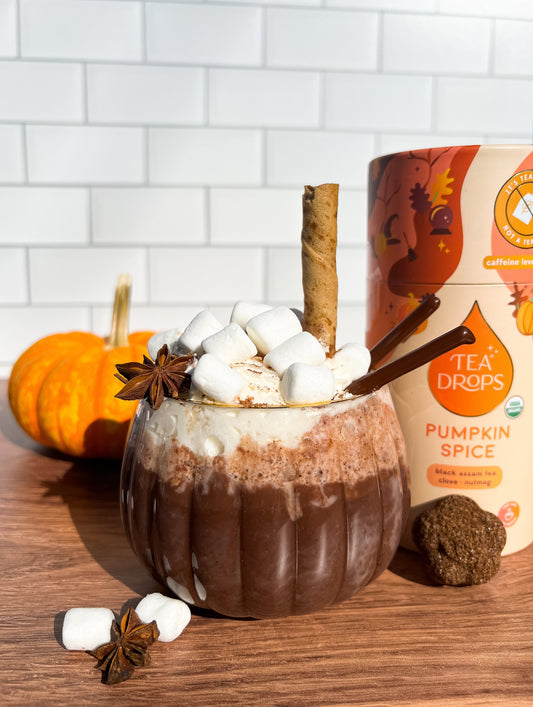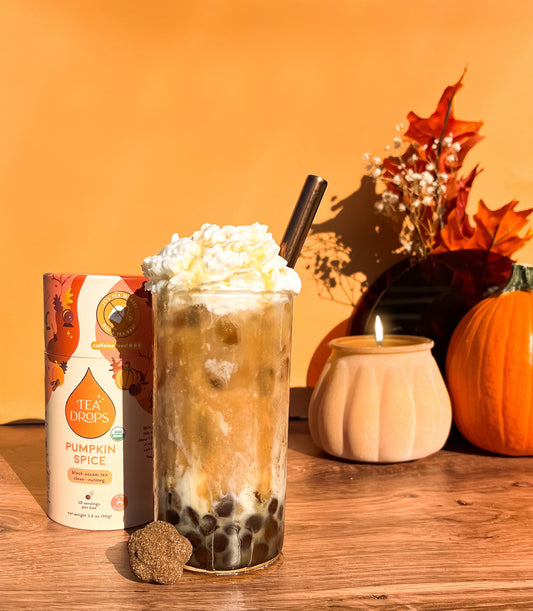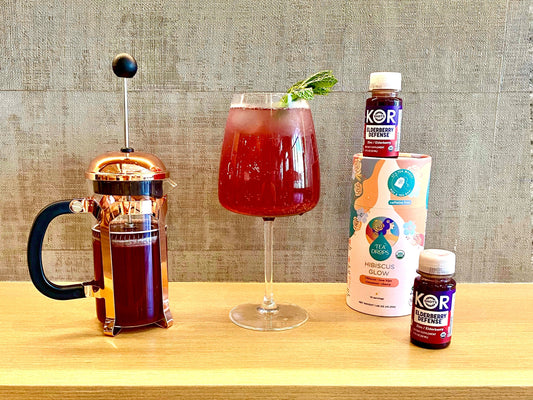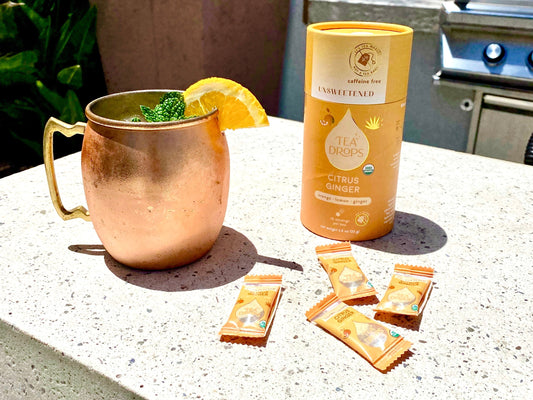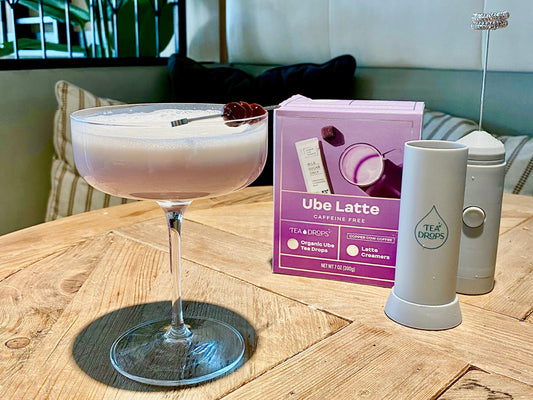An Ancient Healing Tonic
A traditional tea and one of the originals, Oolong may not be as popular or widespread as black tea or green tea, but this ancient tonic has so much to offer. Oolong tea is made from the Camellia Sinensis plant (the same plant that gives us the black and green types of tea too). The difference comes in the processing of the tea leaves. While black tea is fully oxidized and green tea is prevented from oxidizing, Oolong sits somewhere in-between.
Oolong tea is partially fermented and this can sit anywhere between 8-80% which makes Oolong one of the most exciting teas for tea masters as they are able to find their own flavor profile. Oolong tea is artisan tea and its roots stem from China and Taiwan.
One story says that the Chinese named it Wulong which turned to Oolong (black dragon) because of the long dark and twisted shapes of the leaves. The dark and dreamy tea is grown in the high mountains of China where cool winds and the rocky ground gives it that rich and decadent flavor. In Taiwan, the tea is less oxidized and closer to green tea. There are a ton of different varieties of Oolong in Taiwan – and the tea masters play with production and flavor. Whether picked in the spring for a floral flavor touch or picked in the bamboo forests for that woodsy vibe, it’s no wonder that Oolong is like the wine of the tea world.
The flavor of this tea sings with style. It can be everything from bold and bright to delicate and light. It’s such an evocative tea that there are even competitions across Asia for Oolong producers and people flock to sip and share rave reviews about the best tea. When it comes to caffeine count, Oolong tea again sits somewhere between green and black with the higher oxidized version having more caffeine.
But beyond the art of taste and the process of withering, cooling, twisting, and rolling, Oolong tea also comes with a whole host of health benefits too. Rich in nutrients, stuffed with antioxidants, and here to give you your daily dose of goodness, we explore the health benefits stashed inside Oolong tea…
Health Benefits Everyone Should Have!
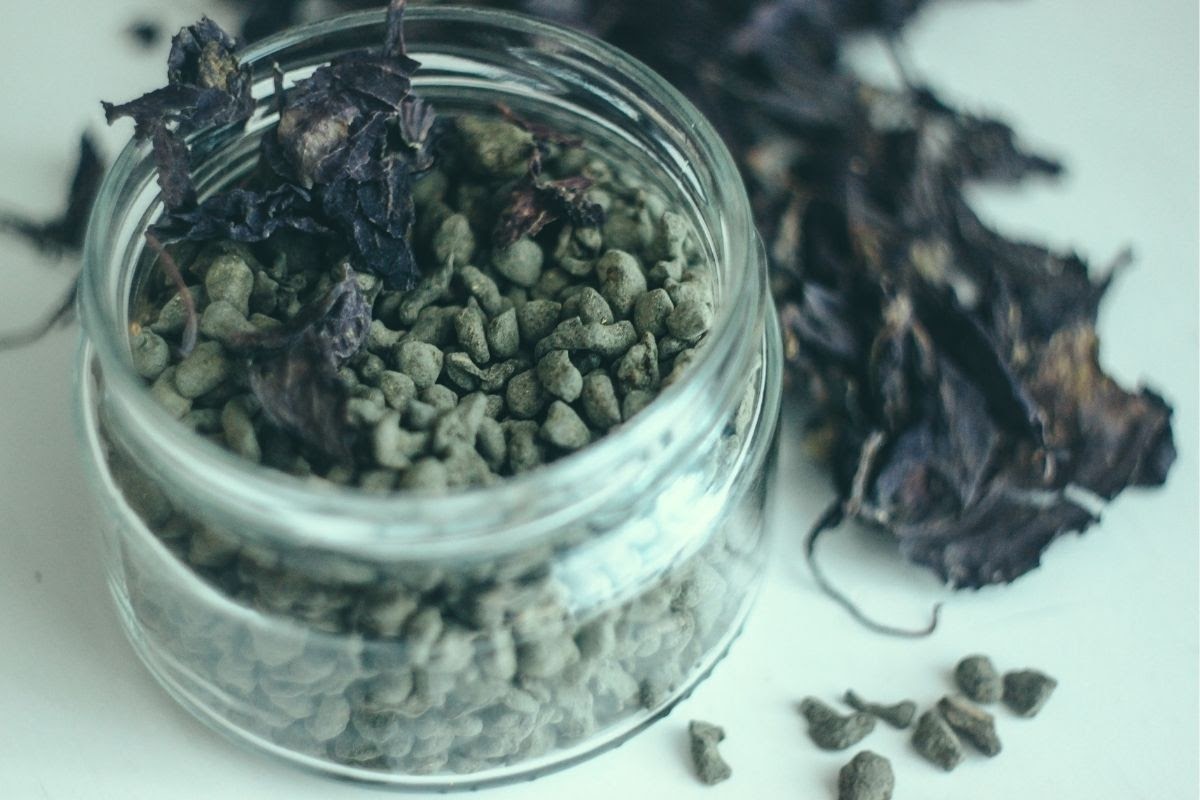
Tea drinkers rejoice! Oolong tea is not only a masterpiece when it comes to taste, but it's also full of amazing health properties too. Soaked in polyphenols, theaflavins, and thearubigins, the consumption of Oolong tea can work wonders for your overall well-being. This tea is loaded with antioxidants like EGCG and can cover everything from reducing the risk of heart disease to fighting cancer, granting you glowing skin, strengthening your teeth, and boosting energy levels too. Let’s plunge right into the healing powers of Oolong tea.
1) Full of Antioxidants
Because Oolong tea has half oxidation this means that it has the antioxidants found in black tea like thearubigins and theaflavins but also the catechins found in green tea too. This means that this magic brew is beautifully loaded with all the good stuff. A study in China found that when studying thirty different teas, oolong had a higher antioxidative count than other teas including green tea in some cases.
2) Aids Weight Loss
For those who are dealing with health issues relating to obesity and who are seeking healthy and natural ways to reduce body weight, oolong tea could be just the solution. An animal study showed that Oolong tea extract led to less abdominal weight even on animals that were fed a high-fat diet. This is just one study and there have been tons more. It’s believed that oolong can help fat oxidation as it encourages active enzymes. It also encourages faster metabolism which can help reduce body weight. Combined with the caffeine that also helps boost energy expenditure, and oolong tea is the perfect storm.
3) Lower Risk of Type 2 Diabetes
Sipping oolong tea may not have an impact on blood sugar levels but it can play a positive hand when it comes to reducing the risk of type 2 diabetes. A Japanese study found that sipping oolong tea every day for thirty days reduced glucose levels in participants by a whopping 30%.
4) Supports the Immune System

Give your immune system a big old boost simply by falling in love with the taste of oolong tea. The flavonoids found in oolong tea are awesome for the immune system and can even help prevent cellular damage along with increasing antibacterial proteins in the body which go on to fight anything that shouldn’t be there. When it comes to cold and flu season, oolong tea can certainly give you a fighting chance but can also lend a hand on fending off free radicals which can cause everything from cancer to strokes and arthritis.
5) Lowers Risk of a Stroke
Speaking of strokes, let's take a look at how oolong tea can help reduce your risk. Green tea and oolong have both been studied when it comes to exploring their positive impact on stroke prevention. The data came back looking good as studies showed that those who supped a cup a day were less at risk of a stroke than those who didn’t. Those who drank three cups of day also found that their chances of having a stroke were reduced by a staggering 21%.
6) Reduced Risk of Heart Disease
Oolong tea proves itself so much more than a self-care routine, it also helps to boost heart health and cut down on cardiovascular disease. Thanks to the abundance of catechins and polyphenols, oolong tea can reduce cholesterol levels and blood pressure, both of which contribute to keeping your ticker in tip-top shape. Studies have shown that those who drink oolong tea had a lower LDL cholesterol level (the bad kind) than those who didn’t. That’s reason enough for us!
7) Helps Eczema
Say farewell to scratchy flaky skin simply by sipping oolong tea for a fine flush of health. While oolong tea gets to work ironing out the kinks on the inside, it also brings its bounty of wellbeing to the external body too – especially in the skin. Its ability to crush free radicals is a surefire side effect of all the antioxidants loaded into this style of tea. Not only will it reduce sensitivity and allergic reactions in the skin, but the antioxidant levels can also help reduce the physical signs of ageing and give you a young and fresh complexion.
8) Improves Sleep

The blend of L-theanine found in oolong tea and GABA have both been found to contribute to deeper, dreamier, longer-lasting sleep. While oolong tea isn’t caffeine-free, this beautiful brew can naturally enhance sleep. L-theanine is an amino acid associated with rest and relaxation as it stimulates alpha waves in your brain which helps the body to settle into a more restful state and also reduces stress levels. While it’s maybe not a great choice as a bedtime drink, simply consuming it in the afternoon will contribute to better sleep overall.
9) Strengthens Teeth and Bones Density
Another added benefit to sipping oolong tea is the strong pearly smile you get thanks to all that calcium and fluoride. The natural addition of fluoride in the oolong leaf helps to combat tooth decay, strengthen enamel, and prevent cavities too. And it's not just your teeth that benefit but your bones too. Osteoporosis is something we all want to avoid and by upping your intake of oolong tea you are less likely to lose your bone mineral density. Again, oolong also naturally contains calcium and magnesium, both of which are known for their brilliant bone health properties.
10) Boosts Energy
While oolong may have half of the caffeine of white tea, it's still enough to give your body and mind the boost it needs. The natural addition of the amino acid L-theanine also brings mental clarity and alertness to the brain but in a totally relaxing way. The polyphenols also bring you out of a slump by helping your body to metabolize quicker (which gives more energy), and by fighting off free radicals and toxins, your overall health is sure to rise which leads to life-bursting, bright and boundless feelings.
11) Helps Fight Cancer
Antioxidants and actively fighting free radicals can be incredibly important properties when fighting against cancer. Oolong tea is believed to lower the cancer risk of certain types of cancer. A study in China found that women who drank black, green, or oolong tea were less at risk for ovarian cancer. Another study in Taiwan found links between oolong tea and preventing neck and throat cancer. While these studies certainly provide interesting reading, the National Cancer Institute reminds us that there is plenty more research to be done to draw conclusive results. Still, even just the hint of oolong tea in the positive fight against cancer is enough to get us pouring with pleasure.
12) Creates a Positive Gut Environment

There has been so much research done into how a healthy gut can heal the body. Creating a positive gut environment is essential if you want to boost immunity, reduce allergies, boost your liver health, and cut out risks of IBS and other digestive issues. Oolong tea can help you to create a healthy happy environment for your microflora to thrive. Studies taking a dive into the link between tea and gut microbiome found that oolong was one of the favorable choices when looking to get your gut in a glorious place of good health.
13) Improves Brain Performance
While too much caffeine can send you into a jittery overdrive, oolong contains just the right amount to zing your brain with a dose of alertness. Thanks to the polyphenols in oolong tea, not only will they get to work on reducing stress levels but they have also been found to potentially help prevent Alzheimer’s. Oolong does this as the polyphenols prevent plaque proteins from attacking brain cells. Oolong tea could be just the drink you need to keep your mind sharp and focused.
14) Elevates Your Mood
Looking for a little mood to pick you up? Oolong tea has got your back. The benefits of high health, mental clarity, a quick energy boost, and the relaxing effects of L-theanine all come together to make sure that you don’t slip into an emotional or physical slump. Not to mention the whole self-care mood around the ritual of brewing yourself some tea to sit in peace for a few minutes.
15) Lowers Risk of Parkinson's Disease
Another sweet side-effect of sipping oolong tea is that it can also help to lower the risk of Parkinson’s Disease. We already know that oolong can boost your brain health and this also includes its ability to increase neurotransmitter activity. The mental alertness that comes with the magic melody of caffeine, L-theanine, polyphenols, and EGCG can keep your brain in a place of cognitive calm.
Oolong Tea Recipe

Now you know all the healing benefits of beautiful oolong tea, we encourage you to brew up. As we mentioned there are so many styles of oolong tea that you are sure to find a blend that suits you. Whether you love it dark and earthy or as light as spring sunshine, part of tasting all these teas is half the fun. Making cups of oolong tea is also super easy and you can enjoy oolong tea leaves either hot and steaming as part of your morning routine or chilled with ice as an afternoon mind and body treat. Here’s how to make the perfect cup of oolong tea…
- If using loose leaf tea a general rule of thumb could be 2 tablespoons of dried open leaves per 6oz of water. If using a bag or tea drops, the math is already done for you!
- Heat your water in the kettle and when hot, pour into your teapot or cup
- Add the leaves and let them steep for 1-5 minutes depending on how strong you like your brew. If unsure, you can sip every minute to check the taste.
- When steeped to your liking, pour the tea through a strainer, or remove the leaves with a spoon.
- If you want to add flavors you can serve with lemon. Oolong tea isn’t always a great match for milk.
- Chilled or iced oolong tea is also delicious with lemon or peach and ice.
Side effects
People have been sipping oolong tea for centuries and it is certainly a safe and delicious drink bursting with health benefits. Some people may want to go slow at the start of their oolong journey to see if the tea is a good match for them. Oolong tea (like most tea) has flavonoids which can sometimes reduce the absorption in the digestive system due to iron levels. Oolong tea also contains caffeine and those who are sensitive to caffeine may want to stick to caffeine-free teas or consume with caution. The side effects of too much caffeine can be:
- Upset stomach
- Constipation
- Headache
- Insomnia
- Jitters
- Irritability
- Heartburn
Wrap Up!
The wine of the tea world is certainly worth exploring. Oolong tea is truly a mesmerizing brew that calls on the skills of the tea masters of the world. Not only is it one of the most exciting teas to explore in terms of different flavors and craft, but the health benefits make it well-worth sipping on a daily basis. For tea lovers craving that balance of magic and medicine, drinking oolong tea is the brew for you.
What are your thoughts on oolong tea and do you have a favorite blend? Share all your oolong tea tales with us in the comments or your thoughts on different teas too.
Medical Disclaimer: While we have delved into the research available on the health benefits of these teas, this is for informative purposes only and shouldn’t be taken as medical advice. Those who have any health-related queries should reach out to a medical professional. These statements have not been evaluated by the Food and Drug Administration. This article is not intended to diagnose, treat, cure, or prevent any disease.

